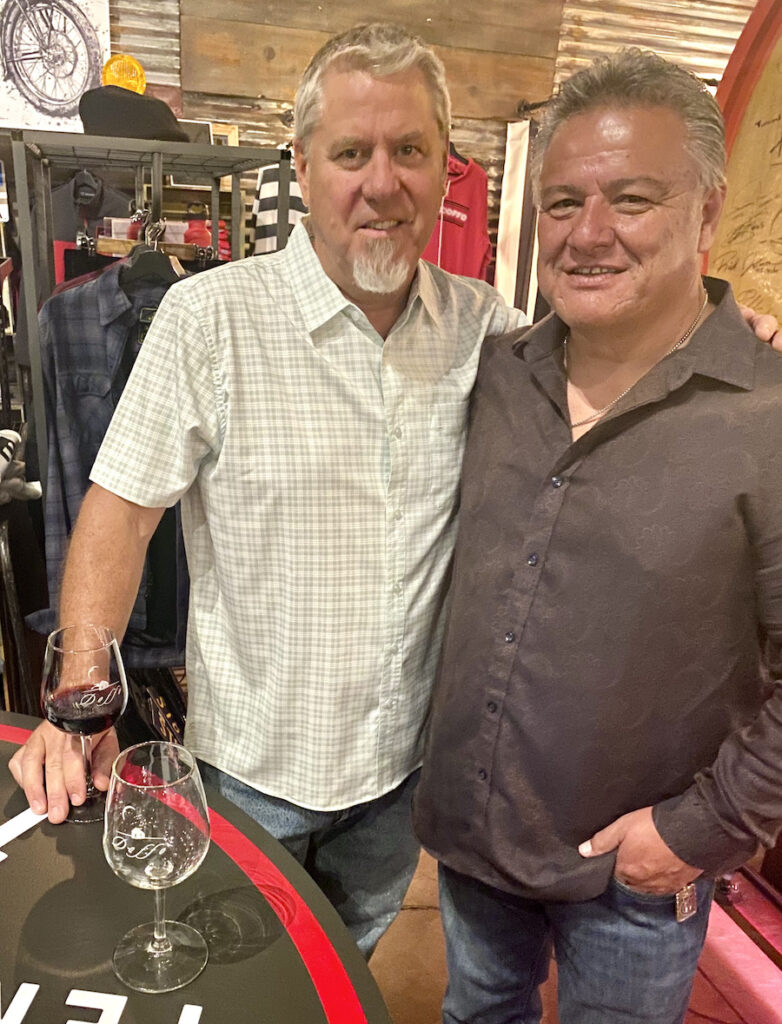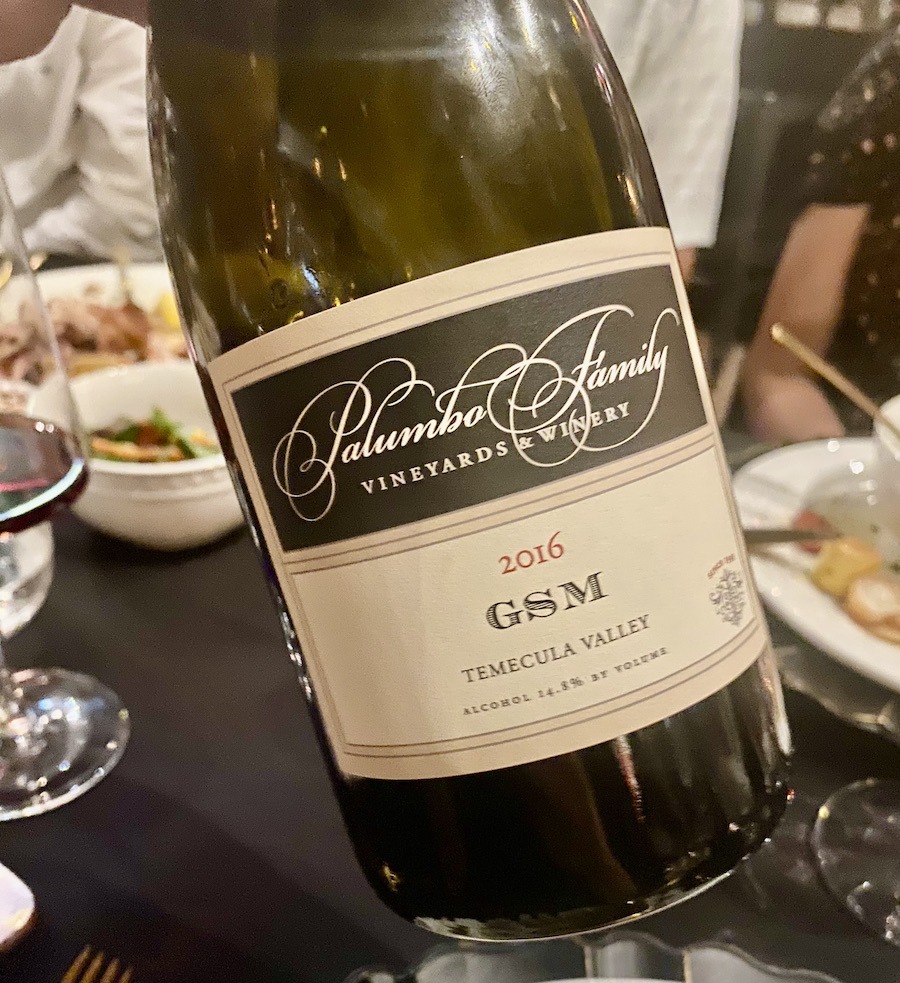Unless you’ve personally visited Southern California, chances are you haven’t had the luxury of sipping wine from Temecula Valley. While the region is home to more than 40 wineries, distribution is slim to none given its proximity to Los Angeles and San Diego and the millions of people who have made Temecula their weekend escape, resulting in most wineries selling out of their wines.
I have had the luxury of visiting Temecula, sipping a ton of amazing wines (that were still in stock) and meeting some of the leaders who have – and still are – shaping this valley, including Nick Palumbo, the owner and winemaker at Palumbo Family Vineyards & Winery…and the past President of the Temecula Valley Winegrowers Association. From a surfer, turned chef, turned grape grower, turned winemaker Nick has been a part of shaping Temecula for more than 20 years. His story – and wines – are one to sip in. I’m excited to share them – at least his story – in Carpe Travel’s Interview with a Winemaker series.
Palumbo Family Vineyards and Winery is committed to small-lot, handcrafted wines from varieties grown on small-block, sustainably farmed wine vineyards.
How did you get into winemaking and producing in Temecula?
I was a typical San Diego beach kid who grew up surfing, life guarding and working in restaurants. I took off to New York City and ended up going to the New School for Culinary Arts. It had an externship that placed students in great restaurants to learn hands-on. As I was learning to cook professionally, I was also learning how wine tied into food.
When I left New York and went back to San Diego I was doing catering work. One of the jobs I landed was in the mountains, which had me passing Temecula. I saw a sign that said, “WINERIES” and literally took a right turn to check them out. I fell in love with the area.
At the time, I didn’t think the world of wine could be a career – the cooking side was. But once I found Temecula, I realized, there’s a wine country, close to where I grew up in San Diego. So I looked around and quickly found a property that has since become my home and my vineyard. The next thing I knew I was making wine. It was one of those right place, right time sort of things that happen in life.
To some extent, I’m kind of genetically programmed for farming and making wine but hadn’t realized it when I was younger. My mom is an Illinois farm girl, and my dad has Sicilian heritage. We were the family with the experimental wines in the garage – with a couple of failed experiments. Nothing ever exploded…but we had a lot of funny experiences when it came to making wine. My parents used to put balloons on the top of the of the glass jugs, so as the balloon got to a certain size they would know the wine was close to done. They’d sip their wine, then throw it away and open a bottle from the store.
Temecula Wine Travel Destination Guide
WHERE TO SIP, STAY & THINGS TO DO
There’s a lot more to just becoming a winemaker. How did you get started after you bought the land that’s now Palumbo Family Vineyards & Winery?
It was the stupidest, luckiest situation in the world. And one of those decisions that just felt like the right kind of thing to do.
I bought a property that had existing vineyards and was under a two-year contract with Callaway Winery, at the time. I closed on the property in July and got a harvest check in October. They bought my grapes and handled all the farming so I really didn’t have to do anything, which gave me time to learn.
I wasn’t getting a lot of money from the grapes but my lifestyle was – and still is – pretty simple. It allowed me to get jobs at other local wineries in Temecula so I could learn. I literally just went and knocked on a couple of doors and said I’d do anything if they would let me work there to learn.
I swept floors and worked a harvest at a small winery. I started making connections in both Temecula and the industry. Obviously, I had the vineyard, so I wasn’t just a cellar rat. I was tied in with the growers, took several concentrated courses at UC Davis and got really involved with the Temecula Valley Winegrowers Association.
When did you take the leap into making your own wines?
Our grapes had a reputation as some of the best grapes in the valley. We had been selling grapes to Callaway’s and a few other local wineries. When the time came to renew the contract with Callaway they wanted to sign for another three years. It was a good opportunity but I had learned a lot and built several strong relationships during those two years. It was a big decision at the time to make. My wife Cindy – who I had met in Temecula – was the one who really encouraged me to open our own winery.
Looking back, had I known what was really involved I would have said there’s no way we can possibly pull it off. But we just did it, and it’s worked out.
Palumbo isn’t your typical Temecula winery. You guys have stayed small unlike many of the other Temecula wineries that have become somewhat resort-like destinations.
Yes, 100 percent. In the Temecula area a 3,000 square foot space is an event space. For us, it’s our entire production. We’re kind of the oddity in Temecula being that we’ve stayed small and want to stay that way.
When we first opened the winery we had a 1,200 square foot building – 400 of that was the tasting room. It was tiny. We made 500 cases in our first year. Twenty years later we have another 3,00 square foot production building and the original 1,200 square foot building we started with makes up the tasting room.
We were moving upwards of producing about 4,000-5,000 cases before 2020. That Covid thing happened and we pushed reset and re-evaluated the business. We decided to slow down and scale back. We’re now producing about 2,000 cases a year.
Why have you decided to stay a smaller winery in Temecula?
My wife, Cindy and I have had a lot of conversations about who we are, what we’re known for and who we want to be. One of the things I attribute our success to is that we’ve stayed true to who we are. In the wine industry the successful wineries are the ones that have a real story and stick to it. That’s always been who we are.
One of the other reasons we have stayed small is the fact that we live on property. Our house is literally onsite…we have raised all four of our kids here and never want to lose sight of that.
We do have several winery friend families who tried to do the same. They started out living on the property and it outgrew them so they had to move. We didn’t want to do that. We like this lifestyle. It comes with some pros and cons… When our kids were little there were a few times people would mistakenly walk into our house for a tasting when they were watching Saturday morning cartoons… We’ve since built a fence to separate the house and tasting area.
One of the huge draws to Temecula as a destination is that it’s an hour drive from San Diego, Orange County, LA and Palm Springs, it’s great for day tripping and lends itself to wineries to build big and go after that market. That’s just not us. We find the people who are really wine savvy – when they find us – are blown away by our wines and the low-key tasting experience.
Staying small has worked for us… We’re open to walk-ins Friday, Saturday and Sunday from 11am-5pm. We do require reservations for groups of six or more. But if somebody wanted to come in on a Wednesday or a Thursday they need to make an appointment. Cindy and I do a lot of tastings but often it’s Reid, our oldest son doing the tastings. He works here full-time now.
Will your kids be taking over the winery?
That may be a little wishful thinking on my end. I’d love it if we stayed a family run winery for generations but we’ll see. We have four amazing kids. I don’t want to push it on any of them.
Having been in Temecula for 20+ years, you’ve seen a lot of change. What are some of the more significant changes in the valley that have shaped the area during your time here?
That’s an interesting question because if somebody came to Temecula and didn’t know anything about the history they’d have a radically different perspective of what it was 20 years ago, but I was fortunate enough to see the early days, the pioneers, and got work with them.
Long story short, Ely Callaway, who owned Callaway Winery was a huge industrialist with tons of money who founded the valley and saw its agriculture potential. He pulled in a land developer who helped him determine what type of agriculture development would do best here.
They brought in some consultants who researched the area and reported back that it was a warm region completely viable for wine grapes. That planted a seed, and Ely Callaway and a few others decided to start planting grapes. I’m way oversimplifying this…but Ely Callaway was a brilliant businessman and didn’t really care too much about what he planted. He just wanted to make sure it sold. So, he planted Riesling and Chardonnay in a warm region, which wasn’t great for making quality wine. They did have business success with it, at one point they were one of the top 10 Chardonnay producers in the country. But quality-wise, the valley suffered.
Now I’m going to put my own spin on it and say what happened after that was the hobbyists movement. The first few pioneers were a lot of hobbyists who loved wine and were retired, or semi-retired. They had been successful in other businesses and were attracted to Temecula, where they got into winemaking and eventually opened their own wineries. But, the winemaking wasn’t sophisticated. It was a hobby. The catch-22 is they had success in opening their wineries, despite the quality of the wines, because of our proximity to San Diego, Orange County, LA, Palm Springs, and all the people coming out for the weekend of a day of wine tasting.
People came to taste for free or for a few bucks, they’d get a buzz on, buy a bunch of wine, and take off. There was no financial incentive to make better wines or pay attention to their farming or barrel program. In my opinion, this is what held Temecula back for years. There was absolutely no need to make better wines because the wineries were always selling out of their wines.
That’s about when I came into Temecula. Don’t get me wrong. There were a few wineries that were concerned with quality. There were a couple of guys doing good stuff. In my steep learning curve and the two years I spent working with other wineries, I realized that the farming and cellar care – cleanliness – wasn’t up to snuff. The attention to detail just wasn’t there. Along with a few other guys, we decided to forget about the bottom line. To not worry about whether we can make a buck or not. To just make good wines. The handful of us started pushing that.
Then the tourism aspect kicked up, it was a huge success, but there was some concern that it was going to be the main focus, and winemaking would be second fiddle to it. It’s a valid concern – and it’s probably true to some extent. But I think now everybody – even the big touristy style wineries – have a good product and are making better wines.
It’s nearly impossible to find Temecula wine outside of Temecula. Why don’t wineries in Temecula distribute? Is it a goal for the industry to start distributing?
Temecula is a destination. It’s an hour drive from San Diego Orange County, LA, Palm Springs, it’s great for day-tripping. Local wineries in Temecula sell out of their wines given all the traffic to the tasting rooms.
Over the years, I’ve seen Temecula grow and succeed in a lot of ways I didn’t think was possible. So, I’m not going to say distribution isn’t a possibility. But right now, I don’t think it’s a focus.
How would you suggest people experience wine in Temecula?
I used to be more involved in the wine association, so I knew more about the day-to-day experiences wineries offered. I’m not as in touch, but I do know Dofo, Heart, Weins offer some interesting wine tasting experiences. For sure, if you’re a wine consumer looking to learn about Temecula wines, going during the week is the way to go. The weekends here can be a zoo – but a lot of fun – as most wineries offer live music, food and of course wine tastings.
What are some of your favorite things to tell people to do when they come into Temecula besides wine tasting?
Gosh, there’s a lot in Southern California. You’re an hour drive from anything. But if you’re just coming to Temecula the old town is really cool. We have a gourmet cheese shop, breweries, amazing restaurants, and antique shops. Then, of course, there’s Pechanga, a big casino that’s not just a casino but more of a destination. They have gambling but also a spa, an incredible golf course, several restaurants and a huge pool area. There’s also hot air ballooning in Temecula, horseback riding, and Lake Skinner where you can rent a boat or go fishing and of course, you can just walking around the vineyards.



